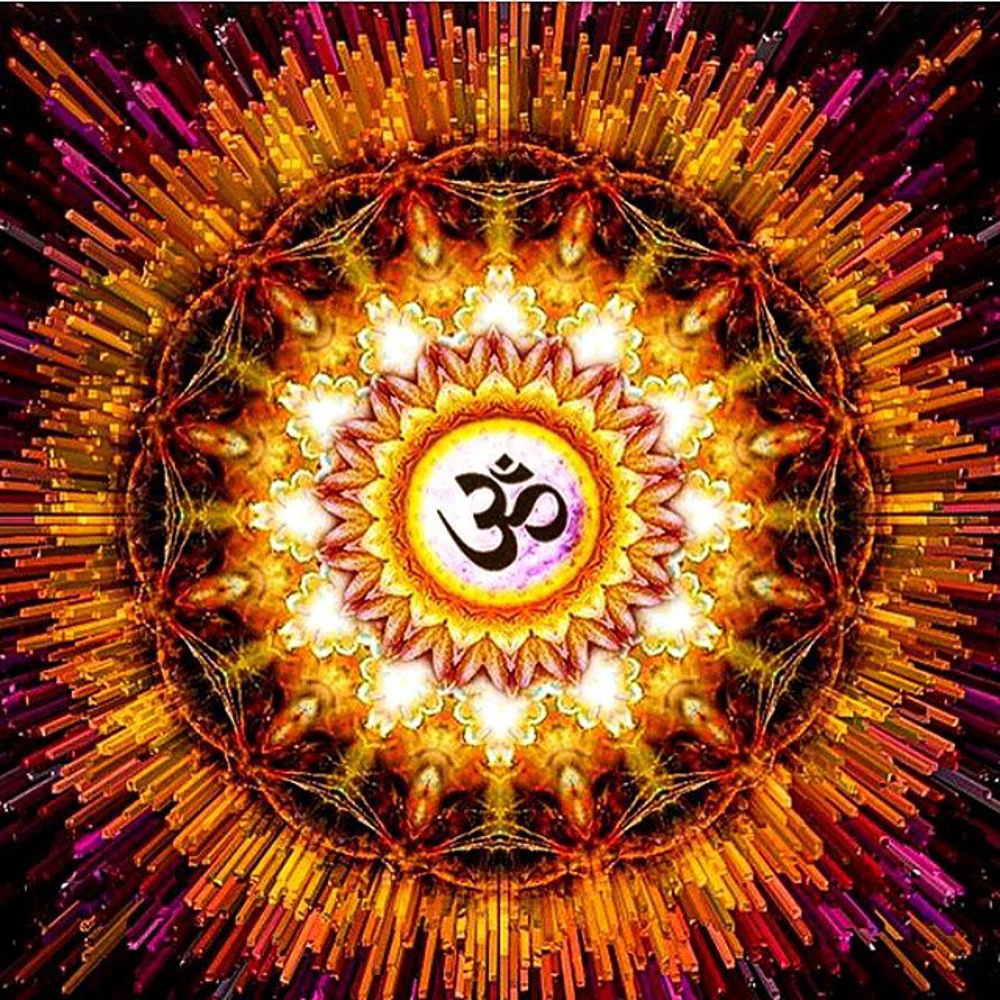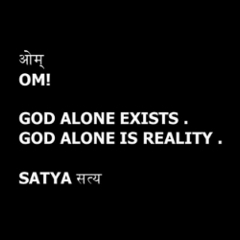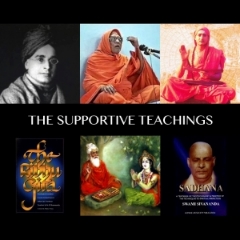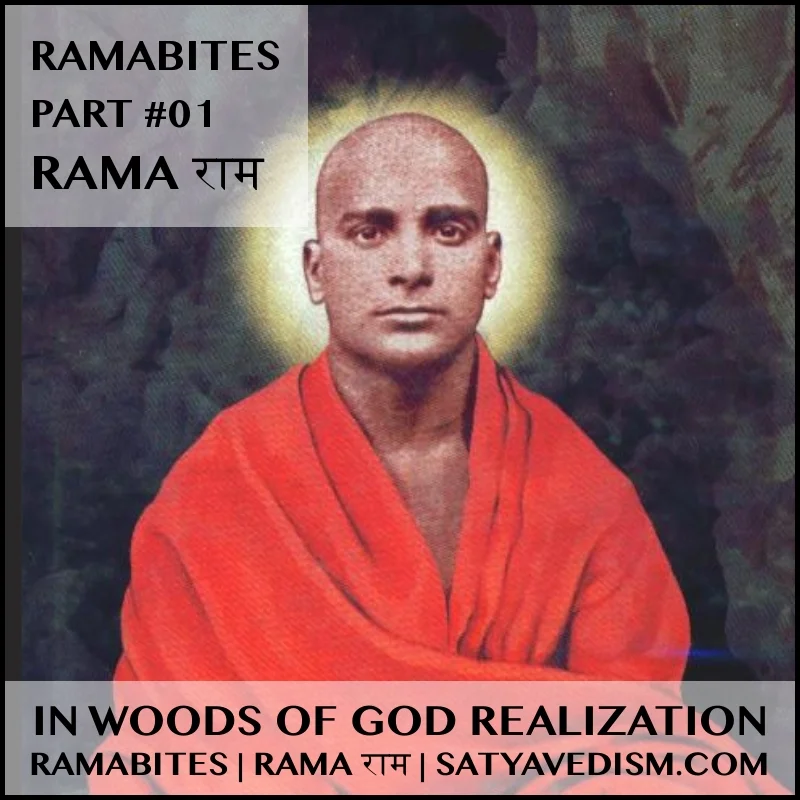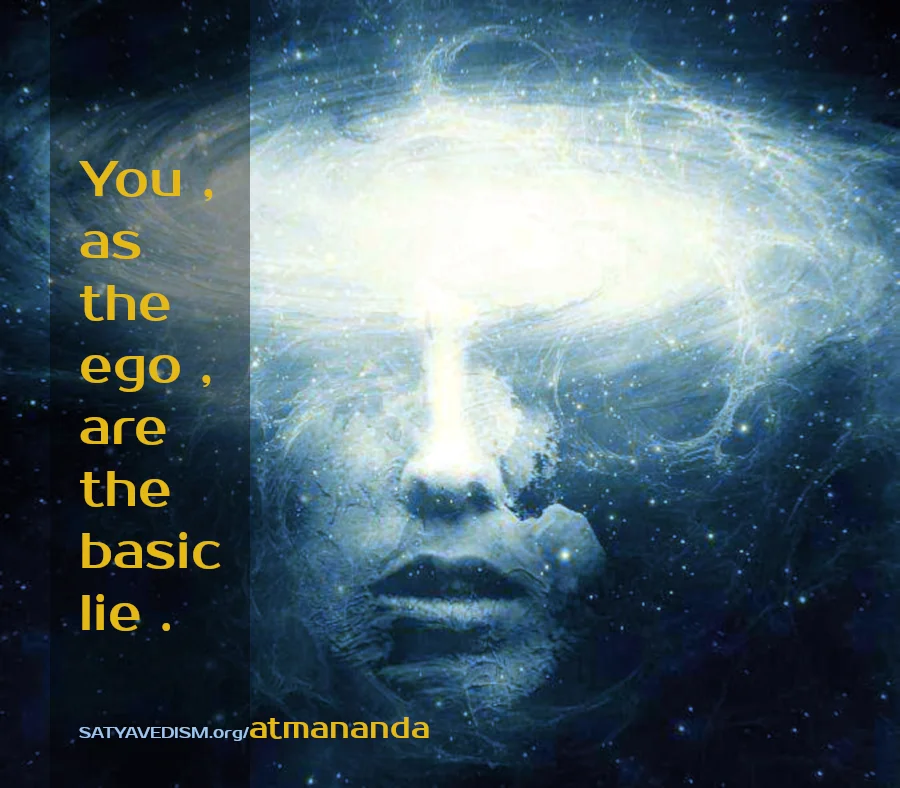BHAGAVADGITA | 4.24 | +RAMANUJA +KRISHNANANDA
| | homeBHAGAVADGITA | 4.24 | SRI ADI SANKARACARYA
( + SRI RAMANUJACHARYA & SRI SWAMI KRISHNANANDA )
|| CHAPTER 4 | KNOWLEDGE & RENUNCIATION OF ACTIONS ||
Brahmarpanam brahma havir brahmagnau brahmana hutam , brahmaiva tena gantavyam brahmakarmasamadhina || 4.24 ||
4.24 The ladle is BRAHMAN * , the oblation is BRAHMAN , the offering is poured by BRAHMAN in the fire of BRAHMAN . BRAHMAN alone is to be reached by one who has concentration on BRAHMAN as the objective . *
|| BHASYA || Brahma-arpanam , the ladle is BRAHMAN : The knower of BRAHMAN perceives the instrument with which one offers oblation in the fire as BRAHMAN Itself .
One perceives it as not existing separately from the Self , as one sees the nonexistence of silver in nacre . In this sense it is that BRAHMAN Itself is the ladle — just as what appears as silver is only nacre . ( The two words brahma and arpanam are not parts of a compound word , samasa . )
The meaning is that , to a knower of BRAHMAN , what is perceived in the world as ladle is BRAHMAN Itself .
Similarly , brahma-havih , the oblations is BRAHMAN : To a knower , what is seen as oblation is nothing but BRAHMAN .
In the same way , brahma-agnau , ( — this is a compound word — ) in the fire of BRAHMAN :
The fire into which oblation is hutam , poured ; brahmana , by BRAHMAN , by the agent , is BRAHMAN Itself .
The meaning is that BRAHMAN Itself is the agent ( of the offering ) .
That one makes the offering — the act of offering — , that is also BRAHMAN .
And the result that is gantavyam , to be reached by one ; that also is brahma eva , surely BRAHMAN .
Brahma-karma-samadhina , by one who has concentration on BRAHMAN as the objective :
BRAHMAN Itself is the objective ( karma ) ; one who has concentration ( samadhi ) on That is brahma-karma-samadhih .
The goal to be reached by one is BRAHMAN alone .
Thus , even the action undertaken by one who desires to prevent humanity from going astray is in reality inaction , for it has been sublated by the realization of BRAHMAN .
This being so , in the case of the monk from whom action has dropped off , who has renounced all activity , viewing one's Knowledge as a ( kind of ) sacrifice , too , becomes all the more justifiable from the point of view of praising full realization .
That is , whatever is well known as ladle etc in the context of a sacrifice , all that , in the context of the Self , is BRAHMAN Itself to one who has realized the supreme Truth . If not so , then , since all in BRAHMAN , it would have been useless to specifically mention ladle etc as BRAHMAN .
Therefore , all actions cease to exist for the one of realization who knows that BRAHMAN Itself is all this .
And this follows also from the absence ( in one ) of the idea of accessories . * For the act called " sacrifice " is not seen to exist without being in association with the idea of accessories .
All such acts as Agnihotra etc are associated with the ideas of such accessories as making an offering etc to the particular gods who are revealed in the scriptures , and with the idea of agentship as also desire for results . But they are not found bereft of the ideas of such distinctions as exist among action , accessories and results , or unassociated with the ideas of agentship and hankering for results .
This ( apparent ) ( activity of one of Knowledge ) , however , stands dissociated from the ideas of differences among the accessories like ladle etc , actions and results , which get destroyed by the Knowledge of BRAHMAN .
Hence , it is inaction to be sure .
And thus has it been shown in :
" One who finds inaction in action " ( 18 ) , " one really does not do anything even though engaged in action " ( 20 ) , " the organs act on the objects of the organs " ( 3.28 ) , " Remaining absorbed in the Self , the knower of Reality should think , ' I certainly do not do anything ' " ( 5.8 ) , etc .
While pointing out thus , the Lord demolishes in various places the ideas of differences among actions , accessories and results .
And it is also seen in the case of rites such as Agnihotra undertaken for results ( kamya ) , that the Agnihotra etc cease to be ( kamya ) rites undertaken for selfish motives when the desire for their results is destroyed .
Similarly , it is seen that actions done intentionally and unintentionally yeild different results . So , here as well , in the case of one who has ideas of distinctions among accessories like ladle etc , actions and results eliminated by the knowledge of BRAHMAN , even activities which are merely external movements amount to inaction .
Hence it was said , " gets totally destroyed " .
HERE SOME SAY : That which is BRAHMAN is the ladle etc . It is surely BRAHMAN Itself which exists in the five forms * of accessories such as the ladle etc and it is Itself which undertakes actions .
There the ideas of ladle etc are not eradicated , but the idea of BRAHMAN is attributed to the ladle etc as one does the ideas of Visnu etc to images etc , or as one does the idea of BRAHMAN to name etc .
REPLY : True , this could have been so as well if the context were not meant for the praise of jnanayajna ( Knowledge considered as a sacrifice ) .
Here , however , after presenting full realization as expressed by the word jnana-yajna , and the varieties of rites as referred to by the word yajna ( sacrifice ) , Knowledge has been praised by the Lord in :
" Jnana-yajna ( Knowledge considered as a sacrifice ) is greater than sacrifices requiring materials " ( 33 ) .
And in the present context , this statement , " the ladle is BRAHMAN " etc , is capable of presenting Knowledge as a sacrifice ; otherwise , since BRAHMAN is everything , it will be purposeless to speak specially only of ladle etc as BRAHMAN .
But those who maintain that one has to superimpose the idea of BRAHMAN on the ladle etc , like superimposing the idea of Visnu and others on images etc and of BRAHMAN on name etc , for them the knowledge of Brahma stated ( in the verse ) cannot be the intended subject matter dealt with here , because according to them ladle etc are the ( primary ) objects of knowledge ( in the context of the present verse ) .
Besides , knowledge in the form of superimposition of an idea cannot lead to Liberation as its result ; and what is said here is , " BRAHMAN alone is to be realized by one " .
Also , it is inconsistent to maintain that the result of Liberation can be achieved without full realization . And it goes against the context — the context being of full realization .
This is supported by the fact that ( the subject of) full realization is introduced in the verse , " One who finds inaction in action " , and at the end ( of this chapter ) the conclusion pertains to that very subject matter .
The chapter comes to a close by eulogizing full realization itself in :
" Jnana-yajna ( Knowledge considered as a sacrifice ) is greater than sacrifices requiring materials " , " Achieving Knowledge , one . . . attains supreme Peace " ( 39 ) , etc .
That being so , it is unjustifiable to suddenly say out of context that one has to superimpose the idea of BRAHMAN on the ladle etc like the superimposition of the idea of Visnu on images .
Therefore this verse bears the meaning just as it has been already explained .
( NOTES : * Some translate as " BRAHMAN is the ladle . . . " , etc — TR | * As an object to be known and attained . ( Some translate brahma-karma-samadhina as , " by one who sees BRAHMAN in action " . ) | * See next note . | * Accessories that can be indicated by the five grammatical case-ending , viz Nominative , Objective , Instrumental , Dative and Locative . ( As for instance , the sacrificer , oblation , ladle , sacrificial fire , and BRAHMAN . — TR )
BHAGAVADGITA | 4.24 | SRI RAMANUJACHARYA
|| CHAPTER 4 | RENUNCIATION OF ACTION IN KNOWLEDGE||
Brahmarpanam brahma havir brahmagnau brahmana hutam , brahmaiva tena gantavyam brahmakarmasamadhina || 4.24 ||
4.24 BRAHMAN is the instrument to offer with ; BRAHMAN is the oblation . By BRAHMAN is the oblation offered into the fire of BRAHMAN ; BRAHMAN alone is to be reached by one who meditates on BRAHMAN in one's works .
|| BHASYA || The expression " BRAHMAN is the instrument to offer with " * is adjectival to " the oblation " . That by which an offering is given , such as a ladle , is an Arpana . It is called BRAHMAN because it is an effect of BRAHMAN , BRAHMAN being the material cause of the Universe .
" Brahmaarpanam " is the oblation , of which the instrument is BRAHMAN . The oblation , just like the instrument with which it is offered , is also BRAHMAN . It is offered by the agent BRAHMAN into the fire of BRAHMAN .
One is the Brahma-karma-samadhi who contemplates thus on all acts as filled with the Supreme BRAHMAN or as having the Supreme BRAHMAN as the Self .
One who contemplates on BRAHMAN as the Soul of all actions , reaches BRAHMAN alone , as one's own self has the Supreme BRAHMAN as Its Self .
The meaning is that the individual self — which is BRAHMAN because of Its having BRAHMAN as Its Self — has to realise Its own real nature .
All actions performed by an aspirant for release have the form of knowledge because of their association with the contemplation of the Supreme BRAHMAN as their self . They are a direct means for the vision of the self without the meditation of Jnana Yoga .
( NOTES : * It is to be remembered that in Ramanuja's system " BRAHMAN " in the primary sense is the " Whole " with the Supreme Being as the Soul and Atmans and Matter ( Prakrti ) as Its body in inseparable union with the Whole . So the word " BRAHMAN " can , according to the needs of each context , be used to indicate the Supreme Being , the Atman , or Prakrti ; In verse 24 it has been used in all these senses . We have therefore put it in italics . See Introduction . )
BHAGAVADGITA | 4.24 | SRI SWAMI KRISHNANANDA
|| CHAPTER 4 | VERSE 24 | COLLECTED EXCERPTS ||
Brahmarpanam brahma havir brahmagnau brahmana hutam , brahmaiva tena gantavyam brahmakarmasamadhina || 4.24 ||
4.24 The ladle is BRAHMAN , the oblation is BRAHMAN , the offering is poured by BRAHMAN in the fire of BRAHMAN . BRAHMAN alone is to be reached by one who has concentration on BRAHMAN as the objective .
|| BHASYA 1 || The performer of the action , the deed that is performed , and the process of the action are all like the waters of the ocean rumbling within themselves and , therefore , nobody does any action .
Even when a person is intensely active , actually no action is taking place ; that is the nature of the supreme karma yogin .
By that karma yoga , which is also a method of contemplation and dhyana , one can attain GOD .
|| BHASYA 2 || A sacrament which is dedicated to the Supreme Being is brahmarpanam .
What you offer to the Supreme Absolute cannot be something that is external to you . That which is external to you does not really belong to you , so it cannot be offered . How will you give a gift of something which is not your property ? What is really yours can be offered ; then it becomes charity , a gift .
That which is totally outside you is not your property , because of the fact it is outside . So any amount of material gift is no gift unless you yourself are also there as a part of the gift . Something of you has to go .
What you have to offer to the Supreme Absolute is Atman , and not anything material . Atman is offered to the Paramatman .
The jiva consciousness is dedicated to the Universal Consciousness . You are offered , nobody else .
You offer yourself in the altar of the great yajna of Universal Consciousness — brahmarpanam .
This is the greatest dedication that you can give to GOD .
If GOD asks you , " What will you give Me ? " you cannot offer GOD some bananas or sweets because they are not your possessions . Only you are your possession . You have no right over anything in this world except your own self . Not even one needle can be your property , so the offering that you have to make to the Universal Being is only yourself .
This is jnana yajna , the wisdom sacrifice , as it is so called .
Into the flame of the wisdom of the all-pervading nature of GOD , you offer yourself in the consciousness of a practical annihilation of your individual existence .
When you offer something into the holy fire in a yajna or a sacrifice , you seem to be offering some substance — some material of ghee or rice , etc .
But here in this wisdom sacrifice , what you offer is not some article from the world outside . It is a part of yourself . A little of yourself goes gradually with every little sense of belonging to the whole . This is brahma havir .
Brahmagnau brahmana hutam : You offer yourself into the flame or the fire of GOD so that you get burnt into the ashes of a non-entity altogether .
Who is offering this ? You are offering . Who are you ?
Now another difficulty is placed before you .
The offering is not made by you ; it is made by Itself , to which you are making the offering . It is offering Itself to Itself .
The war of the Mahabharata is waged by the Universal Virat .
It is not engaged upon by Arjuna , Bhima , the Kauravas .
" I have come to engage upon this great work . "
Kalosmi lokaksayakrt pravrddha ( Gita 11.32 ) .
The Viratsvarupa , the Cosmic Form , speaks in the Eleventh Chapter . The great war is the Universal war . It is motivated by the Universal Being for Its Universal purpose , and the Universal is offering Itself in the sacrifice of the yajna of the Mahabharata war .
You cannot lift even a finger unless the central Universal Will operates , even as without the order issued by the total muscular setup of your personality , your fingers cannot lift , your eyelids cannot move ; so is anything that you think or seem to be doing in this world .
Even this so-called yajna that you are trying to perform is a motivation that comes from the Universal Being .
The Universal offers Itself to the Universal .
GOD knows GOD . GOD contemplates GOD .
GOD offers Itself to GOD : brahmana hutam .
Brahmaiva tena gantavyam : The aim , the purpose , the destination of this kind of cosmic sacrifice is the attainment of GOD only .
GOD , through the performance which is also GOD , reaches GOD through the sacrifice , which is also a movement of GOD within Itself . This is the drama of GOD in this world which is GOD , where GOD is the director and the actor , the arena and the light , the audience and the performance .
This is the cosmic drama that GOD seems to be playing for GOD's own pleasure , and not for your pleasure , because you cannot have any pleasure unless this pleasure is there behind you , animating your existence .
Brahmaiva tena gantavyam brahma-karma-samadhina . This kind of sacrifice as mentioned is a kind of communion that you establish with GOD . Brahma-karma-samadhi is the inner communion cosmically attempted by your so-called individuality .
Samadhi is communion , equilibration of consciousness , an establishment of total harmony between the subjective and objective universe so that no one knows who is seeing what — whether the world is seeing you or you are seeing the world . They coalesce into a single existence . That is called samadhi .
And in this consciousness of the sacrifice of yourself in GOD-Consciousness , you are entering into a veritable samadhi condition while you are actually working in the world .
Sahaja samadhi is also the name given to this kind of experience . Varieties of samadhi , or divine communion , are described . In one state of samadhi there is an obliteration of your existence , a consciousness of a flood inundating you from all sides , and an experience of Being as such ; in the other state of samadhi you see the variety of the world , and yet you are in the state of the Infinite .
|| BHASYA 3 || The knower of the world , the knower of nature , the knower of the object through the means of knowledge cannot be isolated from the process of knowledge , and therefore , not from the object of knowledge also .
There is a commingling of the seer and the seen through the process of seeing in the very act of the knowledge of even the littlest thing in this world . This merging of the threefold position of the knowledge context — the seer , the seeing and the seen — is majestically explained in a verse 4.24 of the Bhagavadgita .
The offerer , the offering and that to which it is offered all stand in unison as a single position , and not as a threefold position .
In the knowledge of the world , in the asking for the world , in the desire for things , in the craving for property we seem to be basically demonstrating our togetherness with our world as a whole .
So the errors of perception in the form of longing for things are also indications of a higher fact that is automatically revealed in this very process . The ignorance of the world itself becomes an instructor to overcome the ignorance of the world . The greatest ignorance is desire , and it becomes a mentor , a pointer to the fact of our inseparability from the object of perception , which is the world of nature .
Thus , the knowledge of the world is the world knowing itself . It is not anyone knowing the world because that " anyone " cannot stand as a spectator of the world in the knowledge process .
The very difficulty we feel in keeping the world outside us as an object of the senses has been the root of our troubles . There is what we may call a schizophrenic activity in the process of the very perception of the world — an unnecessary dichotomy created in a condition which is otherwise unitary and incapable of division into the seer and the seen .
Thus , every thought , which is usually the thought of an object outside the thought , is a participant in the object thereof .
Hence , if we are careful enough to investigate into the rise and the action of our thought process , we would be perpetually in a state of meditation because meditation is union with things , and we seem to be always in a state of union with all things .
If it is true that without such a union no knowledge of anything is possible , the knowledge of a thing is union with that thing .
|| BHASYA 4 || The bondage of consciousness is the consciousness of externality , and yoga is supposed to be union . What is the union ? It is the union of consciousness with itself in the essentiality in which it abides in the objects .
The chaitanya , or the consciousness that is perceiving the object , is called vishayi chaitanya .
The consciousness that is embedded in the object that is so perceived is called vishaya chaitanya .
The process of perceiving the object through the sense organs by the vishayi is called pramana chaitanya .
The result that is achieved finally as the consciousness of an object is called prameya chaitanya .
So pramatr chaitanya is the visualiser , pramana chaitanya is the medium , prameya chaitanya is the object , and pramiti is the actually achieved consciousness .
We may think that these are all watertight compartments — that the perceiver is somewhere , that a process of perception emanates from the perceiver and impinges upon an object which is the perceived , and lastly there is a consciousness of the object being there .
We call this sense perception , but it is really not like that .
It is like the rolling of the waves within the bosom of the ocean .
All activities are taking place within the heart of the Cosmos .
4.24 is one of the verses in the Bhagavadgita which tells us in a symbolic manner that all action is taking place internally within the cosmos , and no individual performer is totally free to oneself minus relation with the outer atmosphere .
SOURCE | SATYAVEDISM.ORG

